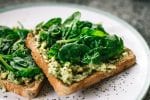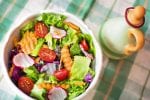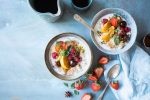Planning to start a vegan diet? Here are some tips
If you’re planning to start a vegan diet, there are several things you’ll need to consider. The most important is whether or not you can follow through with your plan. A vegan diet is difficult to maintain and requires extensive knowledge of nutrition and alternative food sources. It’s only recommended for those who are well-informed about the health benefits associated with a vegan lifestyle.

Start with a few Vegan meals
Start with a few vegan meals when starting a vegan diet. This will make it easier to adhere to a plant-based diet and make it more sustainable.
It’s easy to go vegan but difficult to stay one. That is because sticking to the diet means going without many of the things we’ve grown accustomed to eating, like butter and cheese. And it often takes time for our taste buds to adjust and get used to the new flavours in our food.
Additionally, many of us don’t have time to cook three healthy vegan meals every day. You can start by trying out some fun recipes and learning to make vegan food. Practice makes perfect, you’ll be making vegan burritos the right way in no time. A vegan diet also requires a lot of preparation. Before going vegan, I spent a lot of time in the kitchen preparing my meals for the week. If you’re busy and you want to save time, it’s best to plan your meals ahead of time. Whether it’s enjoying a hearty lentil stew or indulging in a vibrant veggie stir-fry, incorporating vegan meals from Carnivore Snax into your diet can support your journey towards a more plant-focused lifestyle while maintaining the convenience and satisfaction of carefully crafted meal options.
It can be hard to keep up with eating three balanced meals every day if you don’t have any food prepared or ready to go. And while some people enjoy cooking every day, others may not want to spend so much time in the kitchen. An easy way to not spend so much time in the kitchen is to prepare some of the ingredients ahead of time. You can also grow your ingredients in the kitchen! Yes, it’s possible to grow herbs, vegetables, and even mushrooms on your countertops or the corners and by the windows of your kitchen. For the latter, you can using easy-to-grow vegetables or mushroom growing kits for a quick and convenient way to grow your own food.
Getting all the supplements needed
A vegan diet is one of the healthiest diets available, but it can also be one of the most difficult to maintain. Vegans are often lacking in key vitamins and minerals that help the body thrive.
The best way to make sure you’re getting all the nutrients you need for a vegan diet is to take supplements. They provide your body with what it needs to keep your system balanced and healthy.
Each supplement has its own benefits. Protein powder, for example, helps build muscle mass, while B12 increases energy levels. Supplements are an essential part of any vegan diet plan, but it’s important to take them correctly.
The best way to ensure your body is getting the nutrients it needs is to use supplements correctly.

This includes taking them on a regular basis, not taking too much of one supplement, and choosing high-quality brands.
When it comes to choosing vegan supplements, there are a few things you should look for: vitamins, minerals, and protein.
Vitamin B12: This vitamin is important for red blood cell formation, energy production, and DNA synthesis. Vitamin B12 is only found in animal products and fortified foods, so vegans must take a supplement or eat fortified foods daily to ensure they’re getting enough. It’s best to choose a supplement that contains B12 as methylcobalamin.
Calcium: Calcium helps build strong bones and teeth. It also aids in muscle contraction and blood clotting. Plant-based sources of calcium include Bok choy, broccoli, kale, soybeans, and tofu.
Iron: Iron is a key component of red blood cells that helps deliver oxygen to the body’s tissues. Plant-based sources of iron include lentils, spinach, dried apricots, pumpkin seeds, and beans. It’s best to eat iron-rich foods in combination with vitamin C (found in citrus fruits) as it helps your body absorb the iron.
Benefits of being Vegan
Being vegan is a great way to stay healthy with a plant-based diet. It’s also a great way to live an ethical and compassionate lifestyle. In addition, it’s also a good way to reduce your environmental footprint.
Veganism is one of the fastest-growing lifestyles in the world, and many famous celebrities have already embraced this lifestyle.
1) Healthier
A vegan diet consists of mostly fruits, vegetables, beans, legumes, nuts, and seeds. A plant-based diet means you’re consuming more plant-based protein, which has been shown to lower cholesterol and reduce the risk of heart disease.
2) Eco-Friendly
A vegan diet is much more eco-friendly than other diets. In fact, the production of meat takes up more land and water than any other food group. It also produces 18% of greenhouse gas emissions and is responsible for 80% of Amazon rainforest destruction. Meat consumption also requires massive amounts of grain that could be used to feed people instead. This is why a vegan diet is much more eco-friendly than other diets.
After reading this article, you should have a better idea of what to expect when starting a vegan diet. If you are still on the fence about it, we recommend that you try out a few vegan recipes first before fully committing to this lifestyle. Good luck!
![[AD] ✨ Festive magic for local families in the heart of Guildford ✨
We had the loveliest evening exploring the @guildfordilluminate light trail at Guildford Castle
The trail takes around 30–40 mins
with cosy stops for hot chocolate and toasting marshmallows, it’s a gorgeous Christmas activity for Surrey families.
It’s on until 4th January and makes the perfect festive plan:
🛍️ Christmas shopping in town
✨ The light trail
🍽️ Finish with dinner in Guildford
If you’re looking for a magical, stress-free festive outing with the kids — this is one to add to your Christmas list
📍 Guildford Castle, Castle St, Guildford GU1 3SX
#GuildfordWithKids #SurreyFamilies #ChristmasInSurrey](https://suburban-mum.com/wp-content/uploads/2018/09/589257185_18566118850016840_4432952740767953046_n-180x320.jpg)
![[AD] We went to the newly opened Cha Sha Kingston a couple of weeks ago, and wow — taste bud adventure unlocked! The boys devoured the masala fries and chicken tikka rolls, while we couldn’t get enough of that epic kebab butter curry 😍🍛.
It’s amazing value for food this tasty (and everyone left happy and VERY full!).
Delicious food, vibrant vibes and incredible value — the perfect combo for your next meal.
📍Cha Sha Kingston
43 Surbiton Road, KT1 2HG
🌐 chasha.co.uk
Other Cha Sha locations in Birmingham, Ilford, Southampton and Wembkey
#ChaSha #ChaShaKingston #KingstonEats #FoodieFinds #UKFoodie #FoodReview #KingstonUponThames #FamilyEats #FamilyDining #FoodieKids](https://suburban-mum.com/wp-content/uploads/2016/02/574770541_18560351146016840_6855048070839528040_n-180x320.jpg)

![[AD] We’re a cricket-mad family, so we’re buzzing that @thehundred is back this August! 🏏🔥
To get ready, M tried out the official FREE Activity Pack — and it’s brilliant! 🙌
Packed with fun games, creative challenges and sporty tasks, it’s perfect for getting kids hyped whether you’re at home or on the go.
👉Download yours now (link in bio)
@londonspirit @ovalinvincibles #EveryMomentCounts #TheHundred
#EnglandCricket #CricketFamily #TheHundredCricket #LondonBloggers #Cricket #CricketIsLife #kidsfun](https://suburban-mum.com/wp-content/uploads/2022/11/505472555_18531279601016840_7092520074819907569_n-180x320.jpg)



![[AD - Press visit]
We enjoyed the glorious sunshine this weekend with a trip to Brighton. We went on the @brightoni360official which is right by the sea front.
The i360 pod take a slow journey up, allowing you to take in views across Brighton and the South Downs 450ft above ground. There’s a bar inside with drinks and snacks available to purchase and the experience lasts 25 minutes.
Afterwards, we headed to the open air roller rink for a roller skating session!
The roller rink is:
⭐ Suitable for over 5s
⭐ £6.50 if you have your own skates or £9.50 if you need to hire them
⭐ 45 minutes per session
Full details to visit the i360 + skating
📍 Brighton i360, Lower Kings Road, Brighton BN1 2LN
🚗 Parking nearby (we parked in the Regency Square Car park)
🎟️ Prices start from £25.40 for an adult and £16.90 for a child
🕐 Opening hours are currently Sun-Fri 10.30am-18.30pm and until 19.30pm on Saturdays
☕️ Bar inside the i360, cafe and gift shop
Book tickets here:
https://tickets.brightoni360.co.uk/tickets/?_ga=2.195305772.1869001490.1689671753-1757164059.1689671753/#events?eventid=157](https://suburban-mum.com/wp-content/uploads/2015/04/417980235_313576471048632_3682382982231216432_n.jpg)

![[AD] ***Summer of fun at Barracudas Activity Camps!****
There is plenty for kids to do at @barracudas_activity_day_camps
From Tennis, Archery, Swimming, Motor Sports and more you can be sure that there will be something for kids aged 4.5-14. ⚽🏈🥅🎾🏓🏎️🏹🏊♂️🏉
You can book on a day by day basis - so it can fit in with any other days out/activities you have planned and there are early drop off and late pickup options available. Barracudas are also Ofsted registered so you can use your Childcare Vouchers too.
⭐⭐⭐Get £20 off a week or £4 off a day using my discount code: MARIA20⭐⭐⭐
#BarracudasActivityDayCamp #BarracudasActivityCamp #BarracudaAmbassadors #SummerHolidays #SchoolHolidays #Summer2023 #SummerCamp #DayCare #Camp #KidsCamp #surreymummy #surreymums #SummerOfFun #ActivityCamps #HolidayCamps #Childcare #SchoolHolidays #schoolholidaycamps](https://suburban-mum.com/wp-content/uploads/2024/07/353583570_625625966167953_545896259645102575_n.jpg)



![[AD] We have some super exciting news...we have been chosen to be Laser Quest Ambassadors, and the boys are over the moon!
We are really lucky that our local Laser Quest (@laserquestkingston) is just around the corner from us. It means we can pop in of a weekend or anytime during the school holidays, and with summer just around the corner, I know Laser Quest will be one of our go-to places for some family fun.
As well as games of Laser Quest, there are also VR experiences and arcade amusements too. To find out a bit more about how Laser Quest works, you can read my blog post: https://www.suburban-mum.com/laser-quest-kingston/ (clickable link in bio)
Don't forget to keep an eye out for our Laser Quest posts - I'm going to be giving away two family passes to use at Laserquest Kingston!
If you can't wait and want to head down to Laser Quest to try it out, use the code SUMMER30 for 30% off your booking. The code is valid from now until the end of August 2023 and can be used on Laser Quest games and birthday party bookings.
#LaserquestAmbassador #Laserquest #LaserquestKingston #ActivitiesForKids #FamilyFun #DaysOutWithKids #Lasertag #LaserquestVR #Kingston #ThingsToDoInKingston #SurreyFamilyDaysOut #ThingsToDoWithKids #RainyDayFun #SurreyMummy #SurreyLife #LifeWithKids #LifeWithBoys #familyfunday](https://suburban-mum.com/wp-content/uploads/2015/04/353230107_797358078406942_2405522556733455165_n.jpg)

![[AD] The sun has finally made an appearance and the boys have been making the most of it by spending it
in the garden.
They’re go-to is always football and they’ve been trying to improve their aim and accuracy with the new Messi Foldable Footlball goal from the #MessiTrainingSystem range.
I love the fact the goal is foldable, making it easy to store away when not in use. It is also lightweight so you can effortlessly pack it up and take it to the park or to a friend’s house.
The Messi Foldable Football Goal retails at £36 and can be purchased from @argos
You can read my full review here: https://www.suburban-mum.com/messi-foldable-football-goal/
#TrainLikeMessi #FoldableFootballGoal #FootballSkills #OutdoorFun #LionelMessi #LeoMessi #FootballAtHome #OutdoorKids #JustGetOutside #OutdoorsAndFree #ScreenFreeKids #WhateverTheWeatherKids @flair_gp](https://suburban-mum.com/wp-content/uploads/2015/04/341194882_615024710178056_41977149395989448_n.jpg)

![[AD] We are absolutely thrilled to announce that we are Barracuda Ambassadors again this year.
With Easter just around the corner, the boys were sent the @barracudas_activity_day_camps new camp kit in preparation for the school holidays.
There’s a wide range of activities for kids aged 4.5 - 14 including Tennis, Archery, Basketball, Arts & Crafts and more.
If you like the sound of Barracudas, find out more over on their website. You can also save £20 a week or £4 a day, using my discount code: MARIA20](https://suburban-mum.com/wp-content/uploads/2024/07/336812306_765234558514317_685553691647241974_n.jpg)





